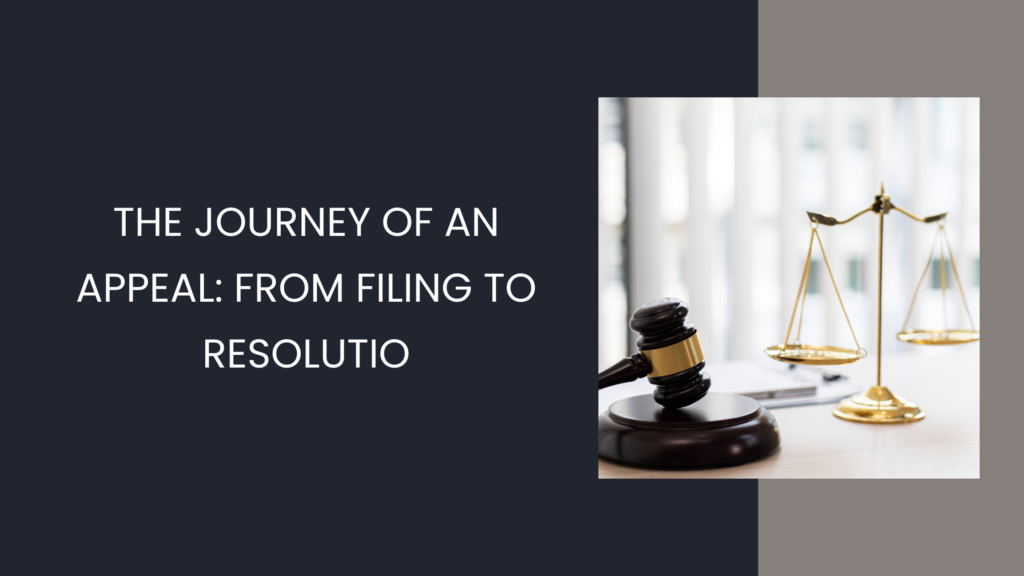The Journey of an Appeal: From Filing to Resolution
Appeals play a crucial role in the justice system, providing a mechanism for correcting errors and ensuring fairness in legal proceedings. Understanding the journey of an appeal, from filing to resolution, can demystify the process and help individuals navigate this complex path.
What is an Appeal?
An appeal is a legal process in which a party requests a higher court to review and change the decision of a lower court. It is not a re-trial but rather a review of the legal issues and procedures of the initial case. The appealing party, known as the appellant, believes that a legal error occurred that affected the outcome of the case.
Key Steps in the Appeal Process
1. Notice of Appeal
The journey begins with filing a Notice of Appeal. This document, filed with the court that issued the original decision, informs all parties involved and the court of the intent to appeal. It must be filed within a specific time frame, typically within 30 days of the judgment, although this can vary by jurisdiction.
2. Preparing the Record on Appeal
The record on appeal consists of all documents, evidence, and transcripts from the trial court proceedings. This record is essential as it provides the appellate court with the context and materials needed to review the case. Both parties work to ensure that the record is complete and accurately reflects the trial court’s proceedings.
3. Writing and Filing Briefs
The appellant and the appellee (the party opposing the appeal) submit written arguments known as briefs.
– Appellant’s Brief: This document outlines the legal errors alleged by the appellant, argues why the lower court’s decision should be reversed or modified, and cites relevant laws and precedents.
– Appellee’s Brief: The appellee responds to the appellant’s arguments, defending the lower court’s decision and explaining why it should be upheld.
In some cases, the appellant may file a reply brief to address points raised in the appellee’s brief.
4. Oral Arguments
After the briefs are filed, the appellate court may schedule oral arguments. During these sessions, attorneys for both parties present their arguments to a panel of judges and may be questioned by the judges. Oral arguments provide an opportunity to clarify points made in the briefs and to address any questions the judges might have.
5. Deliberation and Decision
Following oral arguments, the appellate judges deliberate on the case. They review the record, the briefs, and the oral arguments to determine whether any legal errors occurred that affected the trial’s outcome. The judges then make a decision, which can take several months.
6. The Appellate Court’s Decision
The appellate court’s decision is typically issued in a written opinion, which includes:
– Affirmation: The court agrees with the lower court’s decision, and the original judgment stands.
– Reversal: The court disagrees with the lower court’s decision and overturns it.
– Remand: The court sends the case back to the lower court for further proceedings, which may include a new trial or additional hearings, based on the appellate court’s instructions.
7. Further Appeals
If the parties are dissatisfied with the appellate court’s decision, they may seek a further appeal to a higher court, such as a state supreme court or the Supreme Court of the United States. However, higher courts have discretionary power and may choose not to hear the case.
What to Expect During the Appeal Process
Time Frame
The appeal process can be lengthy, often taking several months to years to reach a resolution, depending on the complexity of the case and the court’s docket.
Costs
Appeals can be costly, involving filing fees, attorney fees, and costs associated with preparing the record and briefs. It’s important to consider these expenses when deciding to pursue an appeal.
Legal Representation
Having skilled legal representation is crucial in an appeal. Appellate law is highly specialized, and experienced attorneys can effectively navigate the procedural and substantive aspects of the appeal process.
Limited Scope
Appeals are limited to reviewing legal errors and do not involve re-examining factual evidence or hearing new witnesses. The focus is on whether the trial was conducted fairly and in accordance with the law.
Conclusion
The journey of an appeal, from filing to resolution, involves several critical steps and requires a deep understanding of legal procedures. While the process can be complex and time-consuming, it serves as an essential check on the judicial system, ensuring that errors are corrected and justice is upheld. Understanding this journey can empower individuals to navigate the appeal process with greater confidence and clarity.


